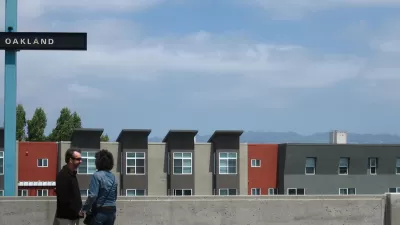A feature article revisits the gentrification and displacement discussion, especially as it pertains to racial and economic demographics, in one of the nation's most troubled and challenging housing markets.

"According to the Bay Area Equity Atlas, a website that tracks the metrics of inequality around the region, 54 percent of low-income households of color are either in neighborhoods that are currently gentrifying or that
are at risk of gentrification," reports Kiley Russell.
"That number is even higher for some communities, with 66 percent of the Bay Area’s low-income African American households either experiencing gentrification or facing the risk of gentrification," according to Russell.
"Also, 55 percent of the region’s low-income Latino households are facing the same pressures, as are 48 percent of low-income Asian or Pacific Islander households and 50 percent of the Bay Area’s low-income Native American households," adds Russell.
The Bay Area Equity Atlas is the work of the San Francisco Foundation, PolicyLink, and the USC Program for Environmental and Regional Equity. PolicyLink Managing Director Sarah Treuhaft wrote to promote the release of the Atlas in June. "The Bay Area Equity Atlas is a comprehensive data resource to track the state of equity across the region and inform solutions for inclusive prosperity," writes Teurhaft. "Data that is disaggregated by race, nativity, geography, and more is critical to charting a more equitable future."
Russell's article provides more context for the debate surrounding gentrification in the United States and the Bay Area, fueled in part by a study released recently by the Federal Reserve Bank of Philadelphia that focused on what it described as benefits of gentrification.
Specific to the Bay Area's example, however, Russell also cites the work of the Urban Displacement Project and the California Housing Partnership in revealing the massive demographic shift of low-income and people of color leaving cities like San Francisco and Oakland for cities farther east in the region, like Pittsburg and other parts of Contra Costa County.
The article also includes a discussion about proposed policy solutions for the housing crisis, and its numerous consequences, such as the gentrification and displacement described in the article.
FULL STORY: Bay Area gentrification displacing communities of color

Study: Maui’s Plan to Convert Vacation Rentals to Long-Term Housing Could Cause Nearly $1 Billion Economic Loss
The plan would reduce visitor accommodation by 25,% resulting in 1,900 jobs lost.

Americans May Be Stuck — But Why?
Americans are moving a lot less than they once did, and that is a problem. While Yoni Applebaum, in his highly-publicized article Stuck, gets the reasons badly wrong, it's still important to ask: why are we moving so much less than before?

Placekeeping: Setting a New Precedent for City Planners
How a preservation-based approach to redevelopment and urban design can prevent displacement and honor legacy communities.

How the ‘Direct Vision’ Design Approach Saves Lives
Designing large trucks to ensure better visibility for drivers can reduce fatal crashes and improve workplace safety.

San Diego Swaps Parking Lane for Kid-Friendly Mini Park
The block-long greenway will feature interactive play equipment and landscaping.

Tracking the Invisible: Methane Leaks From LA’s Neighborhood Oil Sites
Environmental advocates are using infrared technology to monitor and document methane leaks from neighborhood oil sites, filling regulatory gaps and pushing for stronger protections to safeguard community health and the climate.
Urban Design for Planners 1: Software Tools
This six-course series explores essential urban design concepts using open source software and equips planners with the tools they need to participate fully in the urban design process.
Planning for Universal Design
Learn the tools for implementing Universal Design in planning regulations.
Caltrans
Heyer Gruel & Associates PA
Institute for Housing and Urban Development Studies (IHS)
City of Grandview
Harvard GSD Executive Education
Salt Lake City
NYU Wagner Graduate School of Public Service
City of Cambridge, Maryland





























